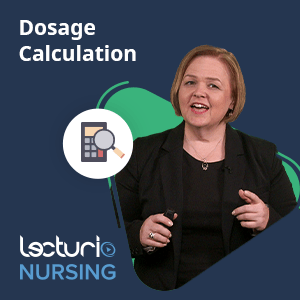A big hurdle is that, because dosage calculation class is quite different from other nursing school classes, students can have trouble figuring out the best way to study, as a lot of traditional study strategies don’t work so well for it.
If you are struggling with Med Dose Calc, don’t worry, there are a few tips and tricks that can help you out. Below you’ll find some Med Dose Calc study tips as well as a few of the tricks on how to pass your Med Dose Calc tests that I used to succeed in the course myself.
Why Nurses Need to Learn Dosage Calculation
Before you begin studying for Dose Calc, it is important to understand why nurses need to learn dosage calculations in the first place. This is because when you are struggling and frustrated, it’s easy to think “Why do I even need to know this” and fall further into a spiral.
I have been there! You go into a hospital for clinical rotations and see automated pumps on which you just hit a few buttons to give the patient the right dosage every time. Everything is digital and automated these days, making classes like Med Dose Calc maddening.
BUT… there is a good reason to know how to calculate medication dosages and rates. It can be summed up into two words: technology fails.
The bottom line of why nurses need to know how to perform dosage calculations is because there won’t always be technology to do it for them. The place where you work may not have new pumps that do calculations, or they may break.
Additionally, this class teaches you how to calculate the correct dose of all medication routes, not just intravenous medications that get run through a pump. For instance, you may have a different strength vial with which you have to draw up the right amount, or a medication that is in multi-dose packaging.
Taking the time to really study and understand Med Dose Calc will eventually be invaluable in your professional practice as a nurse.
Master dosage calculation with the all-in-one online course
From conversions and drug labels, to IV flow rates, ratios, and practice questions: Prof. Rhonda Lawes will guide you to success.
Study Tips for Medication Dosage Calculation
With that being said, let’s get into those study tips, so you can tackle this class!
#1: Memorize the formulas
Included in your Med Dose Calc course should be several formulas that will help you solve all of the various calculations required in nursing. They may be spread throughout the textbook or your professor might have compiled a convenient list.
Either way, it is important to be able to recall them. You may want to try writing them out over and over if you learn by repetition, quiz yourself with flashcards, or employ any other study technique that you find useful for memorization.
#2: Learn common conversions
Having to know unit conversions is one of the worst parts about Med Dose Calc and it can trip you up easily. In your study sessions, take the time to learn the conversions instead of using online conversion software on Google. It is likely that you won’t be provided any conversion information on your exam, and not knowing them by heart will slow you down on a timed test.
As with the formulas, these should be memorized, though you should focus on how to convert different units rather than just remembering all of the numbers individually like times tables. For instance, instead of memorizing that 1000 grams is 1 kg or 500 grams is 0.5 kg, learn how to move the decimal point to convert grams to milligrams to kilograms, etc.
#3: Refresh your memory with fractions & decimals
Along the lines of reviewing the formulas and conversions, it is tremendously helpful to review adding, subtracting, multiplying, and dividing fractions and decimals. Fractions and decimals will pop up a lot in Med Dose Calc, and if you don’t know how to do the basics, you’ll set yourself up for failure.
Even if you are going to have a calculator, at least practice a few times how to use the calculator with fractions and decimals. You’ll thank yourself later!
#4: Pick out clues
Certain words in each question will clue you in on which formula to use or how to calculate the answer.
Let’s use this question as an example: A physician prescribes a medication dose of 20 mg/m²/day by mouth for 14 days. How many milligrams should a 3-foot, 4-inch patient weighing 45 pounds receive each day?
There are a lot of hints in our example question that tell you which formula you’ll need to use to get the answer. “mg/m²/day” along with the information of the patient’s height and weight are screaming at you to use a Body Surface Area (BSA) formula.
Once you have the formula you need, look for words that will help you figure out the steps to perform. In this case, you’ll be using the inches and pounds version of the BSA formula, so the word “foot” tells you that the height needs to be converted to inches.
Additionally, the phrase “each day” lets you know that you only need to find the daily dose, not the total dose for the 14 days, which is just extra information.
Picking out these kinds of buzzwords while you are studying will help you later on in the exam since you’ll begin to recognize the pattern between how the question is phrased and which formulas they lead you to.
#5: Utilize practice problems
Building on the tips above, the best way to study and to implement these things is by using the practice problems that come with your textbook. Your professor may give you some extra problems, though you can find Med Dose Calc practice problems online, too, if you want more practice.
When you are working through any practice problems, try to solve them without referencing a list of formulas or conversions to get better at recalling them.
Related videos
How to Pass Your Med Dose Calc Tests
Now that you know how to study Med Dose Calc, let’s go over a few things that will help you pass your Med Dose Calc tests!
#1: Brain dump before you begin
By the time you take your exam, there is a lot of information that you have crammed into your brain, and you’ll need to be able to recall all of it. Unfortunately, even when we know something before the exam while practicing, it can be hard to remember it after you have trudged through a few questions.
This is why if I am allowed to write some notes during the exam, I do a big brain dump as soon as I begin. You’ll want to write down anything you can remember off the top of your head, but especially any formulas and conversions. When you are partway through and can’t recall a specific formula or piece of information, simply look at the notes you’ve written!
#2: Pay attention to the units
Units may seem like tiny details, but they are always the difference between getting the answer right or wrong. Not only should you pay attention to the units you are starting with and the units you need for the answer, but you’ll also need to consider which units the formula you use is in.
Unfortunately, units get switched around and mixed up in problems that require calculations with multiple steps and conversions, so it is vital to stay organized and not just work with the numbers alone.
Always write the unit next to the number every step of the way.
#3: Focus on what they are asking
As you saw in the example question above, there is frequently information given to you that you don’t need in order to get the answer. Read the question in its entirety, then go back and narrow down what they are asking and what the important information is.
I like to write this down for each question before solving it. That way, I don’t accidentally look at the wrong number or waste time calculating the wrong thing.
#4: Be careful with rounding
Each nursing program or even each question can have different rules for rounding. Some may want two decimal points, and others may call for a whole number. Be careful that you follow the rules provided to you, because a rounding mistake is an easy way to lose points you would have otherwise been given.
Final Advice
Dosage calculation classes in nursing school can be difficult, but remember, there are plenty of resources to help you out.
If you don’t understand how your professor is explaining things, consider utilizing another course, like Lecturio’s Online Dosage Calculation course, so that it can be explained in another way. You can also make appointments to meet one-on-one with your professor, organize a study group with other students, or hire a tutor. Don’t be afraid to take advantage of other resources.
Other than these tips and tricks, if there is any last advice I can offer it’s to breathe, take Med Dose Calc one practice problem at a time, and start studying far before your exam date. You’ve got this!





